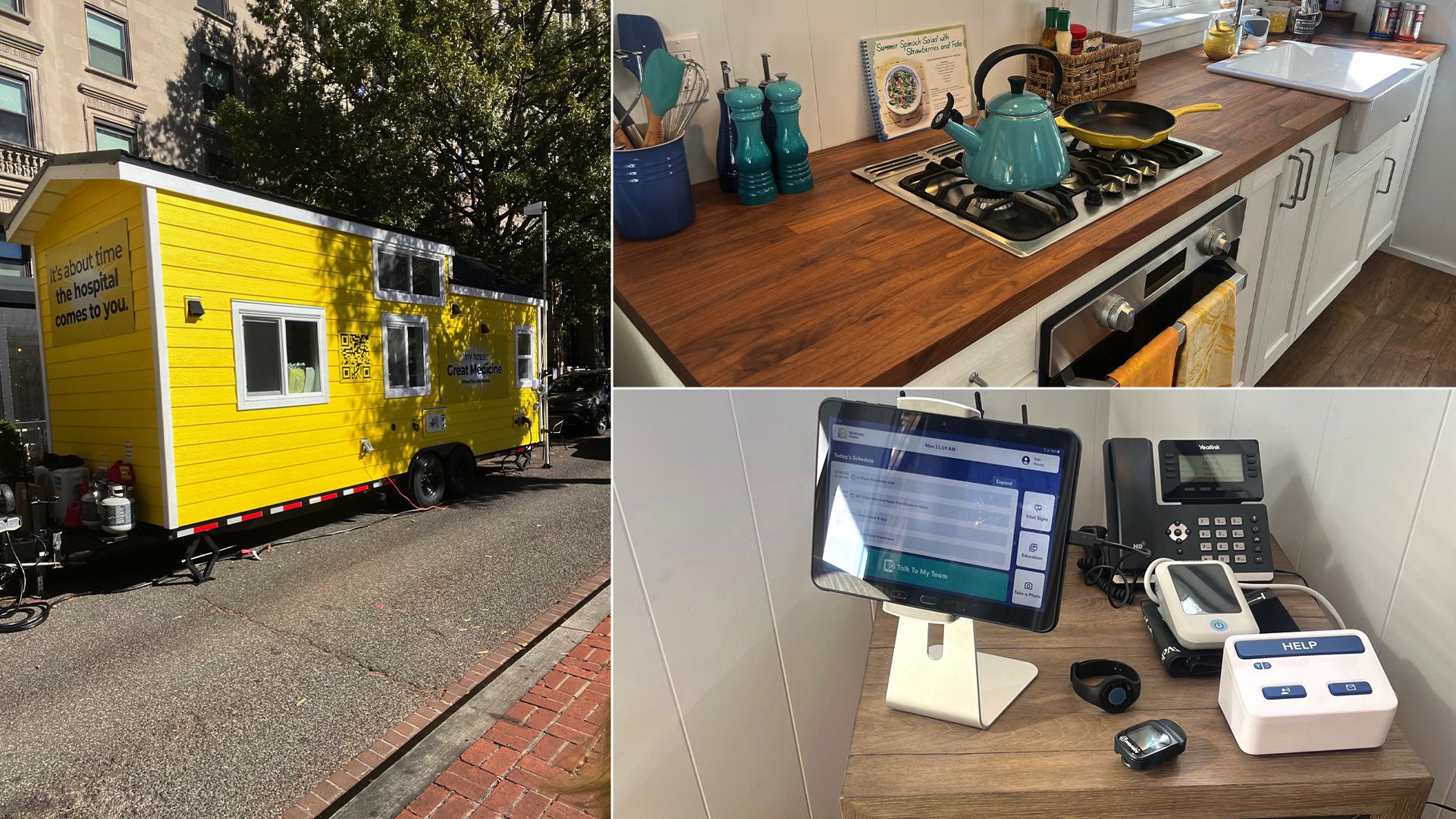A tiny home makes the case for at-home hospital care

- Tina Reed, author ofAxios Vitals

Photos: Tina Reed/Axios
With HGTV-style finishes like butcher block counters and hardwood floors, a tiny house on wheels rolled into Washington this week demonstrating what it looks like to hospitalize patients at home.
Why it matters: Medically Home — one of the companies helping health systems like the Mayo Clinic and Kaiser Permanente launch their own hospital-at-home programs — is making the case for Medicare to extend pandemic-era flexibilities funding at-home hospital care.
- What was once seen as a way to manage a surge of patients during the worst of COVID-19 has morphed into an important way for some hospitals to provide better care to frail patients and fill access gaps, its backers say.
Driving the news: The road show is meant to illustrate to policymakers, health system execs and reporters just how little space and equipment is needed to deliver effective remote hospital care.
In the tiny house set up outside the Coalition to Transform Advanced Care Conference in D.C., a small table holds a collection of simplified electronics patients interact with, such as an iPad that displays a large call button for connecting virtually with a nurse, along with a schedule for provider check-ins.
- Tools for mobile blood testing, ultrasound and IV medication delivery are part of the in-home care providers' toolbox.
- A HIPAA-compliant router creates a secure network to support electronic devices, and a small generator is ready to provide backup if the power goes out.
Between the lines: Keeping patients in their own bed can have enormous benefits, including helping them get a better night's sleep and protecting them from exposure to infections, said Pippa Shulman, chief medical officer of Medically Home.
- Seeing how pills are stored, what food is on the kitchen counter, and even signs a patient has a pet are all important treatment clues for providers when they visit a patient's home, Shulman said.
- Beyond that, hospital-at-home programs could help fill critical voids as rural hospitals shutter, they argue.
- "There's just no way you can build your way out of this problem if you don't have the population to support an existing brick and mortar hospital," said Lisa Tripp, the company's vice president of government affairs.
- As of a year ago, 257 hospitals in 37 states had waivers to provide acute care at home.
Reality check: The idea of bringing hospital care into the home has raised questions about potential increased burdens that could fall on family or friends serving as caregivers.
- It also remains to be seen if better outcomes and lower costs can be borne out over time.
- Medically Home pointed to studies, including one published in the Journal of the American Geriatrics Society earlier this month, that found an insignificant change on caregiver burden among those participating in hospital-at-home.
- So far, they point out, the waiver program has maintained a budget-neutral score from the Congressional Budget Office. However, the savings is not a one-for-one proposition, but measured in reduced strain on the system, Shulman said.
- "Where you're going to see the savings is all of that cost that comes into the system after hospitalization through [skilled nursing facility] utilization, bounceback to the hospital, things like that," Shulman said.
What to watch: The Medicare waiver program is set to expire at the end of 2024, and it's unclear whether it will be continued in some form.
- While some health systems are jumping on the trend, many are still sitting on the sidelines while the program's future remains uncertain, emergency department physician Carolyn Barber wrote in Fortune recently.
- You could imagine a CEO saying, 'Why should I build a home hospital service line if, in December 2024, they're not going to pay for it anymore?'" David Levine, a Harvard internist and clinical research director at Mass General Brigham, told her.
Editor's note: This story was updated with Levine's Mass General affiliation.